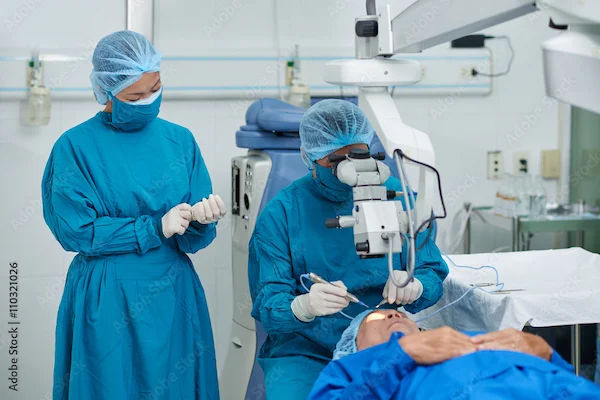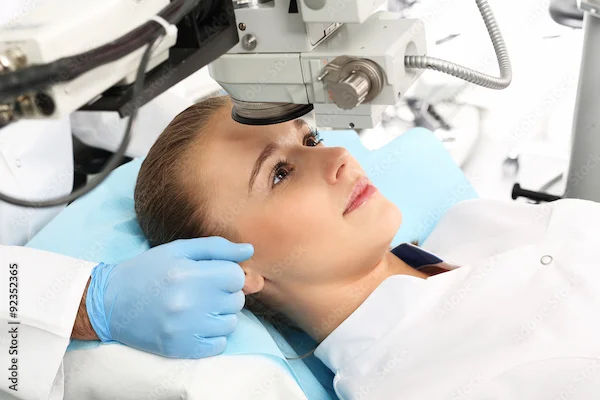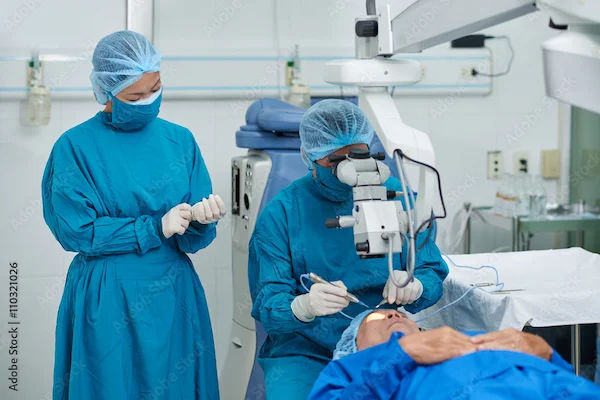Bloodshot Eye After Cataract Surgery
Wondering why your eye is bloodshot after cataract surgery? Learn what causes post-surgery redness, how long it lasts, and when to seek medical help.

Written by Dr.Sonia Bhatt
Last updated on 15th Jul, 2025

Introduction
If you've recently had cataract surgery and noticed that your eye looks red or bloodshot, you're not alone. This is a common concern, and while it can look alarming, it’s usually not a cause for worry. In this article, we’ll explain why this happens, how long it lasts, and when you should seek medical advice.
Why Does the Eye Look Bloodshot After Cataract Surgery?
Cataract surgery is a safe and common procedure where the cloudy lens of the eye is replaced with an artificial one. However, during the surgery, tiny blood vessels in the white part of your eye (sclera) may break, causing redness or a bloodshot appearance. This is called subconjunctival haemorrhage—a harmless condition where blood collects under the clear outer layer of the eye.
Common causes of redness after surgery:
Minor trauma during surgery – The eye is delicate, and even gentle handling can cause small blood vessels to leak.
Increased eye pressure – Temporary pressure changes during surgery may contribute to redness.
Dry eyes – Post-surgery dryness can sometimes make redness more noticeable.
Consult Top Specialists for Personalised Eye Health Advice
How Long Does the Redness Last?
Most patients see improvement within 1 to 2 weeks, but in some cases, it may take up to 3 weeks for the redness to fully disappear. The blood gradually gets reabsorbed by the body, much like a bruise on the skin.
Is a Bloodshot Eye After Cataract Surgery Normal?
Yes, mild redness is normal and not usually a sign of complications. However, you should monitor for other symptoms that may indicate a problem:
When to See a Doctor:
Severe eye pain, not just mild discomfort
Sudden vision changes or loss
Increasing redness after the first few days
Yellow or green discharge, which may indicate infection
Light sensitivity or flashes of light
If you experience any of these, contact your eye doctor immediately.
Tips to Manage Bloodshot Eyes After Surgery
While the redness will fade on its own, these tips can help speed up recovery and keep your eyes comfortable:
1. Follow Post-Surgery Care Instructions
Use all prescribed eye drops, such as antibiotics or anti-inflammatory drops, exactly as directed.
Avoid rubbing your eyes.
2. Apply Cold Compresses
Use a clean, soft, cold compress—never apply ice directly—to reduce redness and soothe irritation.
3. Stay Hydrated & Eat Well
Drinking enough water helps with healing.
Include foods rich in vitamin C, zinc, and omega-3 fatty acids to support healing. Good options include citrus fruits, leafy greens, nuts, and fish.
4. Avoid Strenuous Activities
Heavy lifting, bending over, or intense exercise can increase eye pressure and worsen redness.
5. Protect Your Eyes
Wear sunglasses outdoors to shield your eyes from dust and sunlight.
Avoid swimming or hot tubs for at least a week to prevent infection.
When Will My Eye Look Normal Again?
Most patients notice significant improvement within 7-10 days, but full recovery may take a few weeks. If the redness persists beyond 3 weeks, consult your doctor to rule out other issues.
Can I Prevent Bloodshot Eyes After Surgery?
While some redness is unavoidable, you can minimise it by:
Following all pre- and post-surgery instructions.
Avoiding blood-thinning medications, like aspirin, before surgery unless prescribed by your doctor.
Keeping your head elevated while sleeping to reduce pressure.
Final Thoughts
A bloodshot eye after cataract surgery is usually nothing to worry about and will clear up on its own. However, if you notice worsening symptoms or severe discomfort, don’t hesitate to reach out to your eye specialist.
If you have concerns about your recovery or want to schedule a follow-up, you can book an eye consultation with Apollo 24|7 for personalised care.
Consult Top Eye Specialists
Consult Top Specialists for Personalised Eye Health Advice

Dr. Sujit Pahari
Ophthalmologist
22 Years • MBBS, DNB, DOMS Ophthalmologist/ Eye Surgeon. FIC (Ophthal).
Bilaspur
Apollo Hospitals Seepat Road, Bilaspur

Dr Rajesh Rastogi
Ophthalmologist
33 Years • MBBS, MS Ophthalmology
New Delhi
Rotary Diabetic Centre, New Delhi
Dr. Padmini S
Ophthalmologist
4 Years • MBBS,MS
Bengaluru
Apollo Medical Center, Marathahalli, Bengaluru
Dr. S Venkateswaran
Ophthalmologist
35 Years • MBBS, PGD (OPTHALMOLOGY)
Tiruvannamalai
Shiva Eye And General Hospital, Tiruvannamalai
Dr. V.chittibabu
Ophthalmologist
30 Years • MBBS, MS
Vellore
Krupa Eye Clinic, Vellore
Consult Top Eye Specialists

Dr. Sujit Pahari
Ophthalmologist
22 Years • MBBS, DNB, DOMS Ophthalmologist/ Eye Surgeon. FIC (Ophthal).
Bilaspur
Apollo Hospitals Seepat Road, Bilaspur

Dr Rajesh Rastogi
Ophthalmologist
33 Years • MBBS, MS Ophthalmology
New Delhi
Rotary Diabetic Centre, New Delhi
Dr. Padmini S
Ophthalmologist
4 Years • MBBS,MS
Bengaluru
Apollo Medical Center, Marathahalli, Bengaluru
Dr. S Venkateswaran
Ophthalmologist
35 Years • MBBS, PGD (OPTHALMOLOGY)
Tiruvannamalai
Shiva Eye And General Hospital, Tiruvannamalai
Dr. V.chittibabu
Ophthalmologist
30 Years • MBBS, MS
Vellore
Krupa Eye Clinic, Vellore

.webp)


